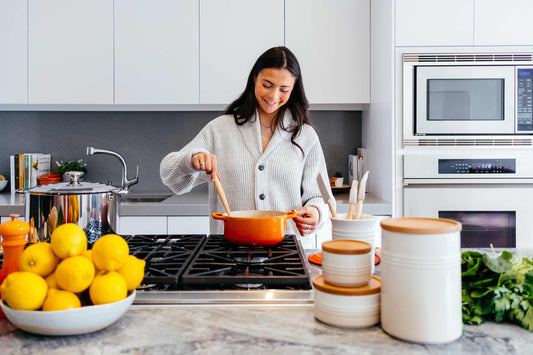Now that Spring has arrived people tend to become more active and spend more time outdoors. This could include evening bike rides after work, walks with friends, gardening or attending yoga classes. Good nutrition along with being active really improves overall health. With the proliferation of fad diets and so much misinformation out there it can be extremely challenging to know what to eat during the day. It can be extremely overwhelming to know just what to pack for lunch!
I recommend eating 3 balanced meals along with one to three snacks per day to keep energy levels consistent and stay well fueled. Ideally, each meal should contain the three macronutrients: carbohydrates, fat, and protein. Approximately 45-65% of our calories should come from carbs, 10-35% from protein, and 20-35% from fat. Occassionally you'll see "water" labeled as a macronutrient - in this article, we're just talking about macronutrients as sources of energy, but hydration is important too - I put together some hydration tips for active lifestyles you might like to review also.
Understanding the 3 primary macronutrients
Carbohydrates
Carbohydrates are the body’s main source of energy. Also, many foods that contain carbohydrates also contain fiber. Fiber is important for maintaining good digestive health. You do not need to avoid carbs or go low carb.
Carbohydrates are found in many foods that come from plants such as fruit, vegetables, beans, whole grains. There are even some carbs found in nuts and seeds. Try to include whole grains and plenty of fruit and vegetables in your diet. Try to fill a third to half of your dinner plate with vegetables.
Protein
One of the main functions of protein is to build and repair muscles. Our bodies contain thousands of different proteins that make up the structural components of our cells and tissues. Active people need protein in their diets, whether you're a serious elite cyclist or just a casual eBike owner who rides for fun.
Protein is even important for our immune systems; antibodies are protective proteins produced by our immune systems. So even if you aren’t an athlete, eating good sources of protein in your diet is still important! Protein breaks down slower than carbs so therefore it is a longer lasting source of energy.
Try to choose lean proteins like grilled or baked chicken, fish, turkey, lean beef, or eggs. Dairy, like milk, Greek yogurt and cheese are also protein foods. If you are vegetarian, vegan, or just want to eat a more plant based diet, try to include beans, nuts, nut butter, seeds, legumes and tofu in your meals.
Fat
Fat is used by the body as energy, storage for the fat-soluble vitamins (A, D, E, and K), and for the production of hormones. It also plays a vital role in protecting our organs. Fat is the slowest source of energy, but also the most energy efficient form of food, since it contains the most calories per gram. Carbs and protein contain 4 calories per gram, but fat contains 9 calories per gram.
Try to include unsaturated fats, also known as “heart healthy” fats, in your diet when possible. Examples of these are fish, nuts, seeds, nut butters, avocados, and olive oil.
Some recommended meals
Breakfast
Research shows eating breakfast helps us pay attention, remember, and perform better during the day. Even if you are not hungry first thing in the morning, it’s preferable to eat a small meal or even snack, such as an apple with peanut butter, rather than nothing. Those that skip breakfast tend to overeat later in the day, have less energy and decreased concentration.
An ideal balanced breakfast contains a carbohydrate, fat and protein. Generally, the carbohydrate sources at breakfast are whole grains or fruit. Whole grains are generally less processed and contain more fiber. Examples of whole grains are whole wheat bread, oats, and quinoa. Carb sources at breakfast can also be fresh fruit like apples, bananas or berries.
Good protein sources at breakfast are eggs (eat the whole egg), low or full fat Greek yogurt (contains more protein than regular yogurt), milk, cheese, and peanut butter. All of those protein foods also contain some fat which is important to have as well. Some sample breakfast ideas are:
- 2 eggs (protein)
- 2 slices bread or a bagel (carb)
- 1/3 avocado (fat)
- Fruit (carb)
- Fruit Smoothie
- 1 cup fruit (carb)
- ½ Greek yogurt (protein and fat if not nonfat)
- 1 cup Milk or water
- 1 handful Spinach or Kale (mostly fiber)
- 1-2 tbsp Peanut butter (fat and protein)
- Oatmeal (preferably old fashioned over steel cut over instant) (carb) topped with fruit (carb), nuts (fat and protein), and Greek yogurt (fat and protein)
** Foods can contain more than one macronutrient, but are generally classified as the one they contain the most of (for example chicken is a protein) but there are some that don’t fit in one category. For example, beans provide protein and carbs. Nuts provide protein and fat.
Lunch
Lunch is also an important meal and should not be skipped. Eating lunch can provide you with a needed mental break and energy to focus for the rest of the day. However, since lunch is usually eaten at an office or school it can be difficult to come up with ideas of what to pack.
A balanced lunch should also contain carbs, fat, and protein. Ideally, it should include some vegetables or fruit as well. Two of my favorite lunch options are:
Sandwich
- 2 slices whole wheat bread (carb)
- Meat of choice (protein)
- Cheese and/or avocado (fat)
- Spinach and/or tomato
- Pickles
Served with Carrots or other veggies (mostly fiber) and hummus (protein and fat)
Grain bowl
- Quinoa (protein and carb)
- Spinach or Kale (mostly fiber)
- Black beans (protein and carb)
- 1/3 Avocado (fat)
- Dressing of choice (fat)
Dinner
After a long day and maybe an evening bike ride, dinner should contain the three macronutrients as well. Eating a good dinner can help with improved sleep. Most traditional dinners contain all three macronutrients, but some examples are chili (vegetarian or with meat), salmon with potatoes and veggies, or a cheese/veggie frittata with toast or rice. Try making a third to half your dinner plate vegetables!
Snacks
Snacks don’t have to contain all the macronutrients but aim to include at least two. Eating one to three snacks throughout the day can help provide balanced energy and prevent you from getting too hungry between meals and then overeating. My favorite snacks are:
- Carrots (carb) and hummus (protein and fat)
- Apples (carb) and peanut butter (protein and fat)
- Fruit (carb) and Greek yogurt (protein and fat)
- Grapes (carb) and cheese (protein and fat)
- Fruit (carb) and trail mix (carb, protein and fat)
- Popcorn (carb) and nuts (protein and fat)
Emily is a Registered Dietitian Nutritionist (RDN) who specializes in Sports Nutrition. She strives to help athletes of any level fuel for optimal performance and health. For more about Emily and to learn more about nutrition for a healthy and active lifestyle, visit Https://Emilywernersportsnutrition.com




